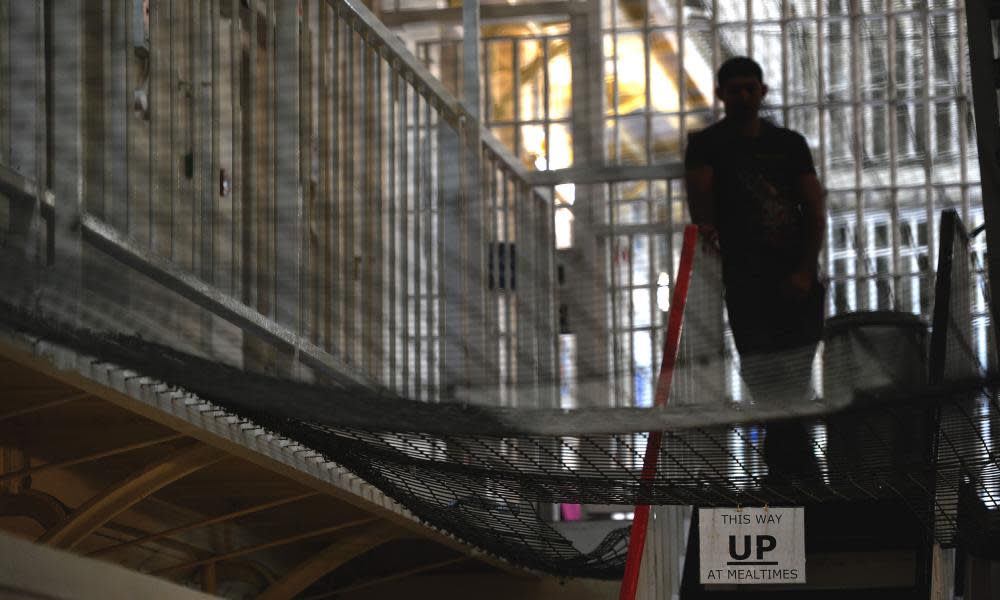Martin has been in and out of prison. He hopes this time will be different

Martin Brooks* has been in and out of prison several times over the years.
When he was released previously, he deliberately breached the terms of his probation so he could end up behind bars again. Before his most recent release, Brooks, an alcoholic in his 40s who also lives with depression, anxiety and post-traumatic stress disorder, attempted suicide in his cell because he couldn’t face trying to rebuild his life.
“I tried to hang myself because I thought, ‘I can’t do this anymore’,” he says. “I’m coming out and I’ve got nowhere to live. I’d had enough. I was fed up. Every time I came out, my drinking was getting worse. I was coming out to nothing all the time.”
For prisoners, release from jail and integrating back into society can be a daunting prospect. For the 72% of male and 70% of female prisoners who experience two or more diagnosable mental health disorders [pdf], meanwhile, it can be even harder without support and treament.
After serving a sentence, prisoners are usually discharged with a plastic bag containing any belongings they arrived at prison with, a £46 grant, and a bus ticket. They are required to attend an appointment with a probation officer, which can be a distance from the prison. Then they’re on their own when it comes to finding accommodation and registering with a GP. It takes weeks for benefits to kick in so, as Robert Elias, a resettlement broker from social justice charity Nacro, says: “It’s impossible – £46 when you’re not in a settled place and having to rely on takeaways is soon gone within days.”
Faced with this, many end up sleeping rough, abusing drugs and alcohol, and reoffending. According to the latest figures from the Ministry of Justice, 24.8% of those released from custody reoffended [pdf] within one year. A study by the Lancet, meanwhile, found that ex-prisoners with mental health problems were more likely to reoffend. Others, like Brooks, intentionally break the terms of their probation, just to end up back in prison. All the while, without proper support or medication, their mental health problems worsen.
For Brooks, this latest release has been different, however. Thanks to a pioneering partnership between Nacro and Oxleas NHS foundation trust in south-east London, he was teamed up with Elias just before his release. With this support, he’s cut back on drinking, moved into supported housing, and is due to start a detox programme. He’s even entered some artwork into an exhibition, and has enquired about enrolling in an art course. He says: “Where good things start, I can see things changing. [Working with Elias] is giving me the incentive to do more for myself.”
The partnership came about after the team at the trust saw a gap in support for prisoners. Dr Al Aditya Khan, a consultant forensic psychiatrist at the trust, says: “Within the prison, there’s an issue with people coming back. When they are released, they are back in the community and often they find it hard to get the support they need ... We looked at if we could intervene at the point following their release when initial treatment is crucial.”
The service started in April 2015 to help prisoners with acute mental health needs. Nacro, which has access to clients’ medical records, works with prisoners for 12 weeks before release, preparing them for what’s to come and then for up to 12 weeks in the community. Where people have high need, that support can continue.
Of the 27 people who have used the service so far, 96% were supported to retain or gain secure accommodation; 89% registered with a GP; 63% didn’t reoffend, or if they did it wasn’t as serious as the original offence; and 93% received benefits. Seven people were recalled to prison and some refused help. As Helen Dyson, London and south area manager for Nacro, says: “I think it’s important to recognise that not everybody is going to get that perfect ending straight away. This contract has the flexibility for us to provide a holistic service and we can address individual needs.”
As well as the obvious benefits for those coming out of prison, Aditya Khan recognises the partnership also has an impact on the NHS. He says: “There’s no point providing [treatment] for a brief period; when it ceases, the patient [may go] back to square one because they’re not getting support. That can be detrimental ... and there’s more possibility they’ll present at A&E. It can add to the burden on NHS services.”
For Brooks, meanwhile, the journey has not been a smooth one. He still struggles with low moods and flashbacks to his abusive childhood, and tried to overdose while he was in temporary accommodation. He remembers: “I was still trapped. I had no television or anything. I was just sitting in my room, staring at the walls.”
With Elias’s support, he’s hopeful and determined to get his life back on track, though. “I’ve had enough of the people I used to hang around with. I just want to knock everything on the head because I can see things moving forwards. I want to progress. I don’t want to stay where I am because I’ll end up going nowhere and I’ll be back to square one.”
* Not his real name
In Ireland and the UK, the Samaritans can be contacted free on 116 123. In the US, the National Suicide Prevention Hotline is 1-800-273-8255. In Australia, the crisis support service Lifeline is on 13 11 14. Hotlines in other countries can be found here
Join the Healthcare Professionals Network to read more pieces like this. And follow us on Twitter (@GdnHealthcare) to keep up with the latest healthcare news and views.
If you’re looking for a healthcare job or need to recruit staff, visit Guardian Jobs.

 Yahoo News
Yahoo News 
